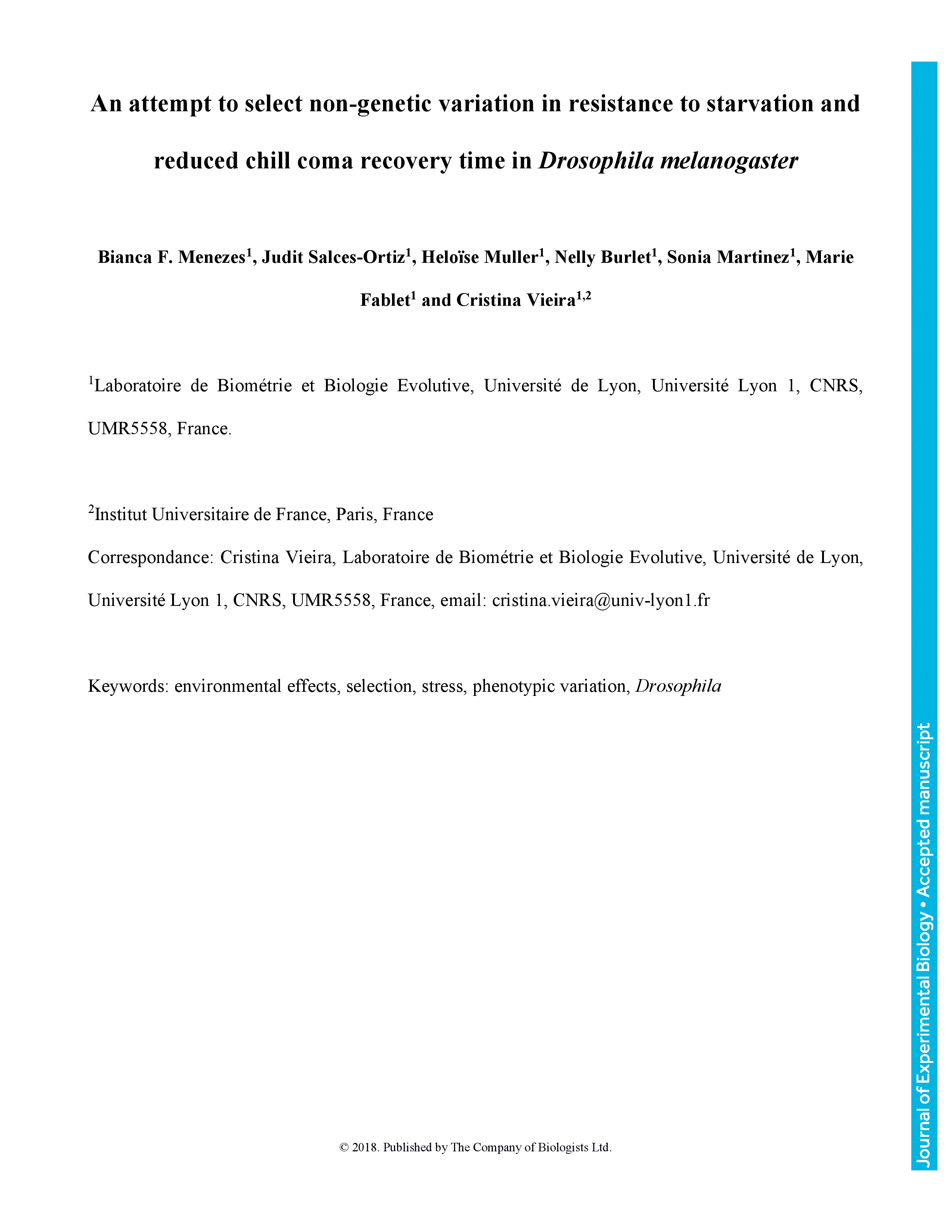Phenotypic variance is attributed to genetic and non-genetic factors, and only the former are supposed to be inherited and thus suitable for the action of selection. Although increasing amounts of data suggest that non-genetic variability may be inherited, we have limited empirical data in animals. Here, we performed an artificial selection experiment using Drosophila melanogaster inbred lines. We quantified the response to selection for a decrease in chill coma recovery time and an increase in starvation resistance. We observed a weak response to selection in the inbred and outbred lines, with variability across lines. At the end of the selection process, differential expression was detected for some genes associated with epigenetics, the piRNA pathway and canalization functions. As the selection process can disturb the canalization process and increase the phenotypic variance of developmental traits, we also investigated possible effects of the selection process on the number of scutellar bristles, fluctuating asymmetry levels, and fitness estimates. These results suggest that, contrary to what was shown in plants, selection of non-genetic variability is not straightforward in Drosophila and appears to be strongly genotype-dependent.
An attempt to select non-genetic variation in resistance to starvation and reduced chill coma recovery time in Drosophila melanogaster
Currently Viewing Accepted Manuscript - Newer Version Available
Bianca F. Menezes, Judit Salces-Ortiz, Heloïse Muller, Nelly Burlet, Sonia Martinez, Marie Fablet, Cristina Vieira; An attempt to select non-genetic variation in resistance to starvation and reduced chill coma recovery time in Drosophila melanogaster. J Exp Biol 2018; jeb.186254. doi: https://doi.org/10.1242/jeb.186254
Download citation file:
Advertisement
2023 JEB Outstanding Paper Prize shortlist and winner

The JEB Editors are delighted to announce the shortlisted authors for the 2023 JEB Outstanding Paper Prize. Read the winning paper - Tiny spies: mosquito antennae are sensitive sensors for eavesdropping on frog calls - by Hoover Pantoja-Sanchez and Brian Leavell from Ximena Bernal's lab at Purdue University, USA.
JEB Science Communication Workshop for ECRs

If you’re an early-career researcher interested in science communication and are attending the SEB Annual Conference in Prague this summer, come a day early and join the JEB Editors at a sci comm workshop to learn the key writing skills needed to promote your research to a broad audience beyond your peers (1 July at 14.30-17.30). Places are limited to 24 attendees, and applicants should apply through the SEB registration page by 30 April 2024.
Bridging the gap between controlled conditions and natural habitats in understanding behaviour

Novel technologies enable behavioural experiments with non-model species, in naturalistic habitats and with underexplored behaviours. In their Commentary, Scholz and colleagues discuss how to obtain a deeper understanding of the natural ecology and lifestyle of study animals.
Beluga metabolic measures could help save species

To help save animals from extinction, it’s important to understand what each species needs to survive. This led Jason John et al. to measure the metabolic rates of captive belugas to develop a ‘fish calculator’ showing that the whales need to eat ~23 salmon per day.
ECR Workshop on Positive Peer Review

Are you an ECR looking for tips on how to write concise, astute and useful manuscript reviews? If so, join the JEB Editors at a 2-hour JEB-sponsored Workshop on Positive Peer Review at the Canadian Society of Zoologists annual meeting in Moncton on 9 May 2024 at 13.00-15.00. There are 25 spaces for ECRs and selection is first come, first serve. To sign up, check the ECR Workshop box when you register for the CSZ meeting.



